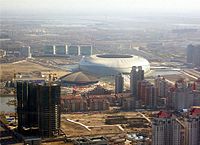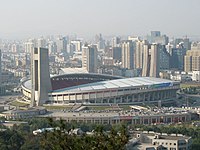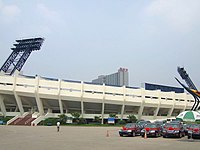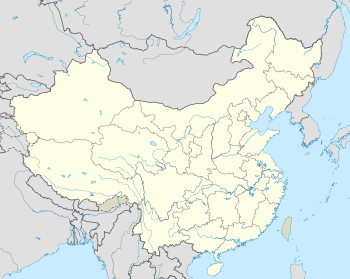The 2007 FIFA Women's World Cup, the fifth edition of the FIFA Women's World Cup, was an international football competition for women held in China from 10 to 30 September 2007.[1] Originally, China was to host the 2003 edition, but the outbreak of SARS in that country forced that event to be moved to the United States. FIFA immediately granted the 2007 event to China, which meant that no new host nation was chosen competitively until the voting was held for the 2011 Women's World Cup.
| 2007年女子世界杯足球赛 2007 Nián nǚzǐ shìjièbēi zúqiú sài | |
|---|---|
 | |
| Tournament details | |
| Host country | China |
| Dates | 10–30 September |
| Teams | 16 (from 6 confederations) |
| Venue(s) | 5 (in 5 host cities) |
| Final positions | |
| Champions | |
| Runners-up | |
| Third place | |
| Fourth place | |
| Tournament statistics | |
| Matches played | 32 |
| Goals scored | 111 (3.47 per match) |
| Attendance | 1,190,971 (37,218 per match) |
| Top scorer(s) | |
| Best player(s) | |
| Best goalkeeper | |
| Fair play award | |
The tournament opened with a record-breaking match in Shanghai, as Germany beat Argentina 11–0 to register the biggest win and the highest scoring match in Women's World Cup history, records which stood until 2019. The tournament ended with Germany defeating Brazil 2–0 in the final, having never surrendered a goal in the entire tournament. The Germans became the first national team in FIFA Women's World Cup history to retain their title.
The golden goal rule for extra time in knockout matches was eliminated by FIFA, although no matches went to extra time (and therefore, none required a penalty shootout).
Teams
The qualified teams, listed by region, with numbers in parentheses indicating final positions in the FIFA Women's World Ranking before the tournament were:[2]
|
|
Venues
The venues selected to host the competition were:[3]
| Tianjin | |||
|---|---|---|---|
| Tianjin Olympic Centre Stadium | |||
| Capacity: 60,000 | |||
 | |||
| Wuhan | |||
| Wuhan Stadium | |||
| Capacity: 60,000 | |||
 | |||
| Hangzhou | Chengdu | Shanghai | |
| Yellow Dragon Sports Center | Chengdu Sports Centre | Hongkou Stadium | |
| Capacity: 51,000 | Capacity: 40,000 | Capacity: 33,000 | |
 |  |  | |
Squads
Match officials
FIFA's Refereeing Department selected 14 referees and 22 assistant referees from around the world to officiate the 32 games that made up the final tournament.[4] Candidate referees for the tournament were placed under scrutiny from 2005 onwards and attended a series of training camps. Candidates refereeing standards were regularly monitored at various tournaments around the globe before a final list was prepared.[5] This was followed by a training camp in the Canary Islands in January 2007 and a final period of preparation and training at the home of FIFA in Zürich in May.[6][7] No referees were chosen from the Oceania Football Confederation at the finals. The original selection group was made up of 42 entrants,[8] 6 of which failed fitness tests resulting in the final group of 36 being confirmed for China.[9] The United States was the only country represented by two referees.[7]
Unlike the men's tournaments, the quartets of match officials do not necessarily come from the same country or confederation. This selection system was explained by Sonia Denoncourt, the head of women's refereeing at FIFA's Refereeing Department, "We don't have as many referees among the women and we certainly don't want to sacrifice quality. What we are looking for above all is compatibility on the field of play and the closest possible language links in the team selected for each game. The most important thing for us is that the referees have a good performance in the match."[5] A fourth official was chosen from those referees not officiating a game at that time.
The referees stayed together throughout the competition at their hotel base in Shanghai.[5] From there they travelled to the various venues for their designated games, before returning to base camp to continue with their specialised training programmes.[5] As well as fitness training, they attended regular theory sessions and reviewed previous matches to try to identify possible errors and improve their performance levels. A psychologist was also assigned to the group to help with their mental preparations ahead of games.
| Confederation | Referee |
|---|---|
| CONMEBOL | Estela Álvarez (Argentina) |
| Confederation | Assistant referee |
|---|---|
| AFC | Fu Hongjue (China PR) |
| Sarah Ho (Australia) | |
| Airlie Keen (Australia) | |
| Kim Kyoung-min (South Korea) | |
| Liu Hongjuan (China PR) | |
| Liu Hsiu-mei (Chinese Taipei) | |
| Hisae Yoshizawa (Japan) | |
| CAF | Tempa Ndah (Benin) |
| Souad Oulhaj (Morocco) | |
| CONCACAF | Cynette Jeffery (Guyana) |
| Cindy Mohammed (Trinidad and Tobago) | |
| Rita Muñoz (Mexico) | |
| María Isabel Tovar (Mexico) | |
| CONMEBOL | Rosa Canales (Ecuador) |
| UEFA | Susanne Borg (Sweden) |
| Cristina Cini (Italy) | |
| Miriam Dräger (Germany) | |
| Corinne Lagrange (France) | |
| Irina Mirt (Romania) | |
| Hege Lanes Steinlund (Norway) | |
| María Luisa Villa Gutiérrez (Spain) | |
| Karine Vives Solana (France) |
Draw
The group draw took place on 22 April 2007 at the Guanggu Science and Technology Exhibition Centre in Wuhan after the completion of the qualifying rounds.[10]
FIFA automatically seeded the host and defending champions, slotting China and Germany into Group D and Group A, respectively.[11] The FIFA Women's World Ranking for March 2007 was used to determine the teams to occupy the other seeded positions, B1 and C1.[12] United States were ranked first, Germany second and Norway third,[13] so the United States and Norway were also seeded.
Also, no two teams from the same confederation could draw each other, except for those from UEFA, where a maximum of two teams from UEFA could be drawn into the same group. Group B quickly became dubbed the group of death[14] since three of the top five teams in the world were drawn in this group – the USA (1st), Sweden (3rd) and North Korea (5th), according to the June 2007 FIFA Women's World Rankings, the last to be released before the tournament. The same four teams were drawn together in Group A in the 2003 FIFA Women's World Cup,[14] on that occasion the US and Sweden progressed to the knockout stages.
| Pot 1 | Pot 2 | Pot 3 | Pot 4 | Pot X |
|---|---|---|---|---|
 China (D1) China (D1)  Germany (A1) Germany (A1)  Norway Norway  United States United States |  Australia Australia  Japan Japan  North Korea North Korea |  Denmark Denmark  England England  Sweden Sweden |  Argentina Argentina  Ghana Ghana  New Zealand New Zealand  Nigeria Nigeria |  Brazil Brazil  Canada Canada |
Group stage

All times are local (UTC+8).
| Tie-breaking criteria for group play |
|---|
The ranking of teams in the group stage was determined as follows:[15]
|
Group A
| Pos | Team | Pld | W | D | L | GF | GA | GD | Pts | Qualification |
|---|---|---|---|---|---|---|---|---|---|---|
| 1 |  Germany Germany | 3 | 2 | 1 | 0 | 13 | 0 | +13 | 7 | Advance to knockout stage |
| 2 |  England England | 3 | 1 | 2 | 0 | 8 | 3 | +5 | 5 | |
| 3 |  Japan Japan | 3 | 1 | 1 | 1 | 3 | 4 | −1 | 4 | |
| 4 |  Argentina Argentina | 3 | 0 | 0 | 3 | 1 | 18 | −17 | 0 |
Germany  | 11–0 |  Argentina Argentina |
|---|---|---|
| Report |
Group B
| Pos | Team | Pld | W | D | L | GF | GA | GD | Pts | Qualification |
|---|---|---|---|---|---|---|---|---|---|---|
| 1 |  United States United States | 3 | 2 | 1 | 0 | 5 | 2 | +3 | 7 | Advance to knockout stage |
| 2 |  North Korea North Korea | 3 | 1 | 1 | 1 | 5 | 4 | +1 | 4 | |
| 3 |  Sweden Sweden | 3 | 1 | 1 | 1 | 3 | 4 | −1 | 4 | |
| 4 |  Nigeria Nigeria | 3 | 0 | 1 | 2 | 1 | 4 | −3 | 1 |
The four teams were also paired in the same group in 2003.
Group C
| Pos | Team | Pld | W | D | L | GF | GA | GD | Pts | Qualification |
|---|---|---|---|---|---|---|---|---|---|---|
| 1 |  Norway Norway | 3 | 2 | 1 | 0 | 10 | 4 | +6 | 7 | Advance to knockout stage |
| 2 |  Australia Australia | 3 | 1 | 2 | 0 | 7 | 4 | +3 | 5 | |
| 3 |  Canada Canada | 3 | 1 | 1 | 1 | 7 | 4 | +3 | 4 | |
| 4 |  Ghana Ghana | 3 | 0 | 0 | 3 | 3 | 15 | −12 | 0 |
Norway  | 7–2 |  Ghana Ghana |
|---|---|---|
| Report |
Group D
| Pos | Team | Pld | W | D | L | GF | GA | GD | Pts | Qualification |
|---|---|---|---|---|---|---|---|---|---|---|
| 1 |  Brazil Brazil | 3 | 3 | 0 | 0 | 10 | 0 | +10 | 9 | Advance to knockout stage |
| 2 |  China (H) China (H) | 3 | 2 | 0 | 1 | 5 | 6 | −1 | 6 | |
| 3 |  Denmark Denmark | 3 | 1 | 0 | 2 | 4 | 4 | 0 | 3 | |
| 4 |  New Zealand New Zealand | 3 | 0 | 0 | 3 | 0 | 9 | −9 | 0 |
New Zealand  | 0–5 |  Brazil Brazil |
|---|---|---|
| Report |
|
China  | 2–0 |  New Zealand New Zealand |
|---|---|---|
| Report |
Knockout stage
Bracket
| Quarter-finals | Semi-finals | Final | ||||||||
| 22 September – Wuhan | ||||||||||
 Germany Germany | 3 | |||||||||
| 26 September – Tianjin | ||||||||||
 North Korea North Korea | 0 | |||||||||
 Germany Germany | 3 | |||||||||
| 23 September – Wuhan | ||||||||||
 Norway Norway | 0 | |||||||||
 Norway Norway | 1 | |||||||||
| 30 September – Shanghai | ||||||||||
 China China | 0 | |||||||||
 Germany Germany | 2 | |||||||||
| 22 September – Tianjin | ||||||||||
 Brazil Brazil | 0 | |||||||||
 United States United States | 3 | |||||||||
| 27 September – Hangzhou | ||||||||||
 England England | 0 | |||||||||
 United States United States | 0 | |||||||||
| 23 September – Tianjin | ||||||||||
 Brazil Brazil | 4 | Third place play-off | ||||||||
 Brazil Brazil | 3 | |||||||||
| 30 September – Shanghai | ||||||||||
 Australia Australia | 2 | |||||||||
 Norway Norway | 1 | |||||||||
 United States United States | 4 | |||||||||
Quarter-finals
Germany  | 3–0 |  North Korea North Korea |
|---|---|---|
| Report |
Semi-finals
Germany  | 3–0 |  Norway Norway |
|---|---|---|
| Report |
Third place play-off
Final
Awards
The following awards were given at the conclusion of the tournament.[21][22][23] FIFA.com shortlisted ten goals for users to vote on as the Goal of the Tournament.[24] The Most Entertaining Team award was also decided by a poll on FIFA.com.[25][26][27]
| Golden Ball | Silver Ball | Bronze Ball |
|---|---|---|
 Marta Marta |  Birgit Prinz Birgit Prinz |  Cristiane Cristiane |
| Golden Shoe | Silver Shoe | Bronze Shoe |
 Marta Marta |  Abby Wambach Abby Wambach |  Ragnhild Gulbrandsen Ragnhild Gulbrandsen |
| 7 goals, 5 assists | 6 goals, 1 assist | 6 goals, 0 assists |
| Best Goalkeeper | ||
 Nadine Angerer Nadine Angerer | ||
| Goal of the Tournament | ||
 Marta Marta | ||
 79' for 4–0 in Semi-finals vs United States (27 September) 79' for 4–0 in Semi-finals vs United States (27 September) | ||
| FIFA Fair Play Award | ||
 Norway Norway | ||
| Most Entertaining Team | ||
 Brazil Brazil | ||
All-Star Team
| Goalkeepers | Defenders | Midfielders | Forwards |
|---|---|---|---|
|
|
Statistics
Goalscorers
There were 111 goals scored in 32 matches, for an average of 3.47 goals per match. Marta of Brazil won the Golden Shoe award for scoring seven goals.
7 goals
6 goals
5 goals
4 goals
3 goals
2 goals
1 goal
 Eva González
Eva González Lauren Colthorpe
Lauren Colthorpe Heather Garriock
Heather Garriock Collette McCallum
Collette McCallum Cheryl Salisbury
Cheryl Salisbury Sarah Walsh
Sarah Walsh Daniela
Daniela Formiga
Formiga Pretinha
Pretinha Renata Costa
Renata Costa Candace Chapman
Candace Chapman Martina Franko
Martina Franko Sophie Schmidt
Sophie Schmidt Melissa Tancredi
Melissa Tancredi Bi Yan
Bi Yan Song Xiaoli
Song Xiaoli Xie Caixia
Xie Caixia Anne Dot Eggers Nielsen
Anne Dot Eggers Nielsen Katrine Pedersen
Katrine Pedersen Vicky Exley
Vicky Exley Jill Scott
Jill Scott Fara Williams
Fara Williams Annike Krahn
Annike Krahn Simone Laudehr
Simone Laudehr Martina Müller
Martina Müller Kerstin Stegemann
Kerstin Stegemann Anita Amankwa
Anita Amankwa Adjoa Bayor
Adjoa Bayor Florence Okoe
Florence Okoe Yūki Nagasato
Yūki Nagasato Cynthia Uwak
Cynthia Uwak Kil Son-hui
Kil Son-hui Kim Kyong-hwa
Kim Kyong-hwa Kim Yong-ae
Kim Yong-ae Ri Kum-suk
Ri Kum-suk Ri Un-suk
Ri Un-suk Lise Klaveness
Lise Klaveness Lene Storløkken
Lene Storløkken Victoria Svensson
Victoria Svensson Shannon Boxx
Shannon Boxx Kristine Lilly
Kristine Lilly
1 own goal
 Eva González (against England)
Eva González (against England) Trine Rønning (against Germany)
Trine Rønning (against Germany) Leslie Osborne (against Brazil)
Leslie Osborne (against Brazil)
Assists
3 assists
2 assists
1 assist
 Dianne Alagich
Dianne Alagich Lisa De Vanna
Lisa De Vanna Caitlin Munoz
Caitlin Munoz Sarah Walsh
Sarah Walsh Daniela
Daniela Elaine
Elaine Candace Chapman
Candace Chapman Kristina Kiss
Kristina Kiss Christine Sinclair
Christine Sinclair Ma Xiaoxu
Ma Xiaoxu Zhou Gaoping
Zhou Gaoping Stine Dimun
Stine Dimun Katrine Pedersen
Katrine Pedersen Johanna Rasmussen
Johanna Rasmussen Karen Carney
Karen Carney Rachel Yankey
Rachel Yankey Simone Laudehr
Simone Laudehr Birgit Prinz
Birgit Prinz Kerstin Stegemann
Kerstin Stegemann Adjoa Bayor
Adjoa Bayor Gunhild Følstad
Gunhild Følstad Solveig Gulbrandsen
Solveig Gulbrandsen Siri Nordby
Siri Nordby Ingvild Stensland
Ingvild Stensland Frida Östberg
Frida Östberg Therese Sjögran
Therese Sjögran Victoria Svensson
Victoria Svensson Lori Chalupny
Lori Chalupny Abby Wambach
Abby Wambach
Source: FIFA Technical Report
Tournament ranking
Per statistical convention in football, matches decided in extra time are counted as wins and losses, while matches decided by penalty shoot-outs are counted as draws.
| Pos | Grp | Team | Pld | W | D | L | GF | GA | GD | Pts | Final result |
|---|---|---|---|---|---|---|---|---|---|---|---|
| 1 | A |  Germany Germany | 6 | 5 | 1 | 0 | 21 | 0 | +21 | 16 | Champions |
| 2 | D |  Brazil Brazil | 6 | 5 | 0 | 1 | 17 | 4 | +13 | 15 | Runners-up |
| 3 | B |  United States United States | 6 | 4 | 1 | 1 | 12 | 7 | +5 | 13 | Third place |
| 4 | C |  Norway Norway | 6 | 3 | 1 | 2 | 12 | 11 | +1 | 10 | Fourth place |
| 5 | D |  China (H) China (H) | 4 | 2 | 0 | 2 | 5 | 7 | −2 | 6 | Eliminated in quarter-finals |
| 6 | C |  Australia Australia | 4 | 1 | 2 | 1 | 9 | 7 | +2 | 5 | |
| 7 | A |  England England | 4 | 1 | 2 | 1 | 8 | 6 | +2 | 5 | |
| 8 | B |  North Korea North Korea | 4 | 1 | 1 | 2 | 5 | 7 | −2 | 4 | |
| 9 | C |  Canada Canada | 3 | 1 | 1 | 1 | 7 | 4 | +3 | 4 | Eliminated in group stage |
| 10 | A |  Japan Japan | 3 | 1 | 1 | 1 | 3 | 4 | −1 | 4 | |
| 10 | B |  Sweden Sweden | 3 | 1 | 1 | 1 | 3 | 4 | −1 | 4 | |
| 12 | D |  Denmark Denmark | 3 | 1 | 0 | 2 | 4 | 4 | 0 | 3 | |
| 13 | B |  Nigeria Nigeria | 3 | 0 | 1 | 2 | 1 | 4 | −3 | 1 | |
| 14 | D |  New Zealand New Zealand | 3 | 0 | 0 | 3 | 0 | 9 | −9 | 0 | |
| 15 | C |  Ghana Ghana | 3 | 0 | 0 | 3 | 3 | 15 | −12 | 0 | |
| 16 | A |  Argentina Argentina | 3 | 0 | 0 | 3 | 1 | 18 | −17 | 0 |
Marketing
Sponsorships
Source:[29]
| FIFA partners | National Supporters |
|---|---|
|
Coverage
Numerous TV stations around the world provided coverage of the tournament. One notable example is the Chinese-language channel CCTV-5, which also broadcast over the internet via TVUnetworks.
Monetary rewards
For the first time in FIFA Women's World Cup history, all teams received monetary bonuses according to the round they reached (all in USD):[30]
- Champions: $1,000,000
- Runners-up: $800,000
- Third place: $650,000
- Fourth place: $550,000
- Quarter-finalists: $300,000
- First round exit: $200,000
Other rewards
UEFA used the FIFA Women's World Cup as its qualifying tournament for the 2008 Olympic women's tournament. The best three performing UEFA teams would qualify for the Olympics. Originally it was thought that, should England make the top three European teams, they would compete under the United Kingdom banner. However, on 6 September 2007, FIFA issued a press release indicating that England were ineligible to participate in the 2008 Olympics as England does not have its own Olympic Committee.[31]For the determination of the ranking only first through fourth place, quarterfinal elimination or group phase elimination counted. If there was a need to make a distinction between teams eliminated in the quarterfinal or between teams eliminated in the group phase these teams would meet in a play-off match. In no case would the points or goal difference count for teams eliminated before the semi-final.
Germany and Norway qualified for the Olympics at the World Cup, whereas Denmark and Sweden had to enter a play-off for the third Olympics spot. Sweden won both legs of the playoffs with a total of 7–3 on aggregate to qualify for the Olympics.
Controversies
Kenneth Heiner-Møller and Danish players accused the Chinese hosts of harassment and covert surveillance prior to China's first round match against Denmark. China's Swedish coach Marika Domanski-Lyfors and her assistant Pia Sundhage were unaware of the incidents and Heiner-Møller absolved them of any blame, although he refused to shake hands after the match.[32]

